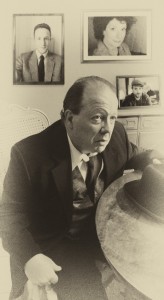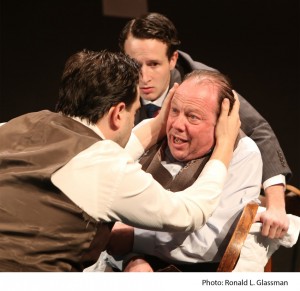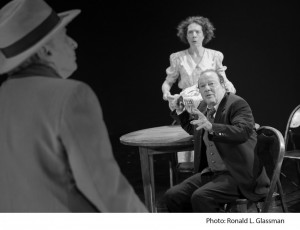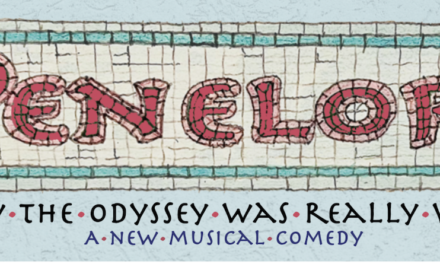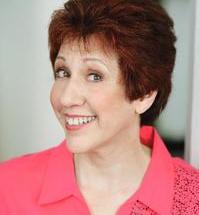By Myra Chanin
Let’s tackle the first problem first. Why did this play need to be translated and performed into Yiddish as it is now in New York through November 22nd? Because the Lomans have been passing as Gentiles when they couldn’t be more Jewish. Playwright David Mamet agrees: “My grandfather was an immigrant. He supported his family as a traveling clothing salesman, on the road five days a week, for 40 years. His type was an everyday fixture of first and second generation American Jewish life. Miller’s master creation, Willie Loman, however, is, to any Jew, unmistakably a Jew. The play, its author, setting and subject — the agony of assimilation, are all Jewish… a struggle between hope, confusion, aspiration and circumstance.”
How much difficulty does unfamiliarity with Yiddish present to anyone watching this production? About as much as not knowing Swedish gives anyone enthralled with Ingmar Bergman. The meaning of every Yiddish word is visible on the faces and in the body motions of every actor in the cast. In addition, the meaning of what they’re saying is projected in easily readable English on two six-foot high background walls.
The slightly tweaked English translation of Arthur Miller’s masterpiece by Joseph Buloff and his wife Luba Kadison was inspired. Buloff, a mainstay of the Second Avenue Maurice Schwartz Yiddish Art Theater Company who moved on to Broadway and Hollywood, learned not to consider a playwright’s original words as gospel from Maurice Schwartz, whose Yiddish translation of King Lear turned a monarch into a man with three daughters-in-law. Previously I’d always felt that the actors playing the Lomans were feigning feelings, and that the flavors of the characters’ experiences and lives were hidden behind a heavy veil. Here the emotions are palpable. Just from watching the expressions on their faces or hearing the joy or anger in their voices, I knew exactly what they were feeling. Director Moshe Yassur’s superb direction merged individual actors into a most moving and compelling company.
Avi Hoffman deserves euphoric Yiddish phrases to describe his couldn’t-be-more-real or more Jewish portrayal of the seen-better-days, inept, unlucky, Willie Loman, but jubilant Jewish phrases are few and far between. Still Avi Hoffman’s performance should give Avi’s Yiddishe Mama, Miriam Hoffman, herself a winner of an Israeli Tony for her Yiddish translation of Neil Simon‘s The Sunshine Boys, enough reflected glory; i.e., naches, to speak about “My son, the actor!” as proudly as the mother of a board-certified cardiac surgeon says, “My son, the doctor!”
Cute, little, balding, lost and ineffective, you know Avi’s Willie would have to bribe a buyer with hosiery to get anywhere sexually with her. His mistaken allusions about being liked, rather than being focused and respected, destroy any chance he might have for success. Suzanne Toren as Linda, Willie’s wife, turnd her into a sexual creature, who touches and smiles at Willie like she’d been hot for him when they were young and maybe even still is.
Daniel Kahn, a Yank who lives in Berlin, made Willie’s older son, Biff, also come totally alive, not as a son who’d been destroyed when faced with Willie’s infidelity and was spiting him, but as a boy who didn’t want to be or was unsuited to be the business tycoon Willie wanted and instead inherited his father’s sublimated love of the outdoors and gardening. Lev Herskovitz as Happy, Willie’s younger son, moved like a cross between a worm and a snake and exemplified everything base about Willie including his lying and womanizing. Itzy Firestone stole every scene he was in as the successful brother Ben, who went into the jungle and came out rich, and Shane Baker, the world’s most Jewish Christian, as Willie’s realistic friend Charley, spoke Yiddish as clearly as if he’d been born in Vilna, and with Ben Rosenblatt, playing his son Bernard, showed that focus and persistence were the real way to success.
To confirm that I wasn’t maligning Lee Cobb (ne Leo Jacob) I watched the opening of the play on YouTube and was once again unmoved by him. When Avi staggers on stage weighed down by his sample cases, you see a Willie at the end of his rope, a man whose muscles have vanished.
I simply can’t get this production out of my mind. Both the company and the cast deserve an abundance of praise for their talents and achievement. Both were inspired. Once again deliberate simplicity produced consequential significance.
Castillo Theater 543 W. 42nd St. NYC 866/811-4111 or visit www.castillo.org




